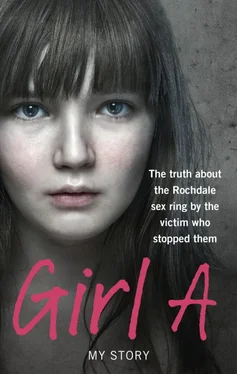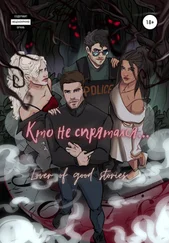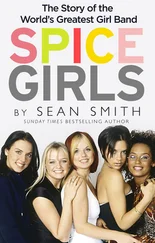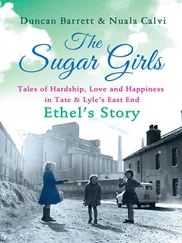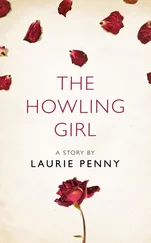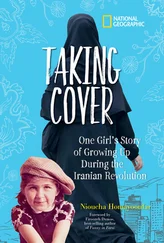It was a spur-of-the-moment thing when it happened. I’d started drinking at around 6 o’clock: just a glass of wine, which became two, then three, then a second bottle. Chloe was asleep.
I don’t know why I did it. Like the first time, I certainly didn’t plan to. I think everything had got to me so much again – their faces, seen again in the VIPER line-ups, peering at me, taunting me, it seemed, after being out of my life for so long. I remember thinking about the evidence I’d given, and wondering whether the police and the CPS had not believed me because I hadn’t cried enough for them in the interviews. They weren’t to know I’d become so used to it all that tears felt cheap now. I just felt useless.
I’d no need to buy the pills; they were already there. It wasn’t a cry for help, it wasn’t – I just knew at that moment that I wanted to die, so I grabbed the pills. There were sixteen in a packet and I took four packets. I started gulping them down, washing them down with wine and then with just water once I ran out of wine.
Then I just lay on the sofa, waiting for the darkness to gather me up. I didn’t write a note, I couldn’t see the point in that.
By then I was so drunk I was half asleep and half throwing up – throwing up some of the pills I’d just swallowed. That’s maybe what saved my life.
I woke up in hospital and, straight away, like before, was full of remorse. I’d left my daughter in her cot and hadn’t even gone into the bedroom to say goodbye to her.
The staff at the housing unit had found me, apparently not long after I’d taken the pills. They said later that people had been knocking on my door and I wasn’t answering, so they came up. Because I wasn’t answering, they used their own key to get in. Just like before.
After the overdose Mum and Dad were looking after Chloe, so I had to go back to my flat in a taxi paid for by the hospital. It was the loneliest of journeys.
I felt as though I hadn’t learned anything, and I was back to square one. Again.
* * *
A few weeks later, in mid May 2011, I was on anti-depressants and Christine was back at the flat. She knew I’d drunk loads on the night of that second overdose, but I didn’t give her any reason, I just promised to change. I went down on her report once again as ‘high risk’ and ‘spiralling out of control’.
Spiralling out of control I may have been but, somehow, for all that I doubted myself, there was something in me that wouldn’t give in. I had a will to live, a will to survive, and a resolve, somehow, to do well.
When I got my college results, Mum and Dad couldn’t believe it, and nor could I: a double distinction and enough to get to university. Maybe I wasn’t the failure I’d convinced myself that I was!
Added to this, the new chief crown prosecutor for the north-west, Nazir Afzal, ordered the case against Daddy and Immy to be reinstated, which meant that, finally, I’d have the chance to put them away for what they’d done to me. It was a moment of pure joy. I celebrated with a bottle of white.
Later on, I heard the CPS had taken a lot of persuading because once they’ve made a decision, they hate to change it. Most of all, though, they have what they call thresholds – a way of deciding whether to go ahead with a case based on the chances of a conviction at the end of it.
Not what you or I would call justice; not what’s right. Just statistics.
My dad says it’s so that someone, somewhere, probably in London, can stand up in front of a Government minister and say the CPS has a 90 per cent success rate, or whatever, in the cases they prosecute. So they can look good.
According to the CPS lawyer who looked at my case, and one of his colleagues who approved it, the chances of getting Daddy convicted – in spite of all the evidence – fell below this threshold.
Mostly it came down to me being too flaky. The jury might not believe me, they thought. And if that happened, they’d lose the case and their ‘success’ rate would come down.
Dad reckons that in the days before the CPS made the decisions about whether to charge people, good detectives tended to go on their gut instincts. Did they think someone was a rapist? Yes? Then charge him.
And if the jury got it wrong, then at least they’d done their level best to do the right thing.
But the people making the decisions in my case were operating in a very different world.
Detectives from Operation Span made the strongest case they could to the CPS and then waited for them to react. For the lawyers at regional headquarters, and perhaps in London, too, it must have felt like sucking razor blades. They dug their heels in for a while, until Mr Afzal looked at the case afresh and decided it was time to bite the bullet. It was one of his first decisions in the job as chief prosecutor and I think he realised that by taking it he was giving me – and all the girls like me – a voice. I’ll always be grateful to him for that.
At the time, though, my life was still messed up and, just as I could see myself finally getting justice, everything else in my life started to fall apart.
I moved out of the housing unit and into my mum and dad’s house because Social Services were threatening to remove Chloe. The idea was that Mum and Dad would control me. If it didn’t work out, they’d remove my little girl.
And of course, I buckled and the social workers suspected that Dad wouldn’t level with them if I’d been drinking or whatever. In the middle of June 2011, Social Services made Chloe the subject of an interim care order, and the following week, Christine, my social worker, called at Mum and Dad’s house.
Chloe was asleep, her head resting in my lap, when we heard the knock on the door.
Social Services had given the impression that if I went back to live with my mum and dad everything would be fine; that they, as responsible adults, would be a safety net even if I went off the rails.
So that’s what I’d done. I’d gone back home for six weeks or so, and actually managed to give up drinking. But it wasn’t enough, not for Rochdale Childcare Services.
They had held a gateway meeting and, suddenly, it wasn’t suitable for Chloe to live at Mum and Dad’s house any more. That was it: she would have to go into temporary foster care.
With a child under five, you only get nine months to prove yourself a fit parent again. At the end of that time, the authorities decide whether they’re going to return your child to you, or else have it adopted.
The next few minutes shattered my heart into a million pieces.
There were forms to fill in – they always have forms – and a farewell to make that would tear me to shreds. Maybe Christine found it hard too, but it didn’t show; at least, not to me. I tried to hold on to Chloe, but it was no good. The social worker knew why she’d come, and she knew she had to go through with it. So she scooped my little girl into her arms and headed towards her car. She had a car seat in the back, and Chloe went into that.
Back then, Chloe had only ever been around me and my family. We were all she knew. She was just beginning to wake up properly and looked up at me, bewildered, as I clicked her in. She could see the tears streaming down my face and started crying herself. My parents, leaning into the car, were distraught. I was beside myself.
When it was over, Dad wrapped me up in his arms and led me back to the house. I was sobbing, inconsolable, my daughter gone. Social Services had taken her.
As the car pulled away, heading over the speed bumps towards the motorway, I was swamped with guilt as I knew it was me who’d made it happen. I started to think how confused she must feel, being taken away in a stranger’s car, soon to be finding herself being handed over to a couple just as alien.
Читать дальше
